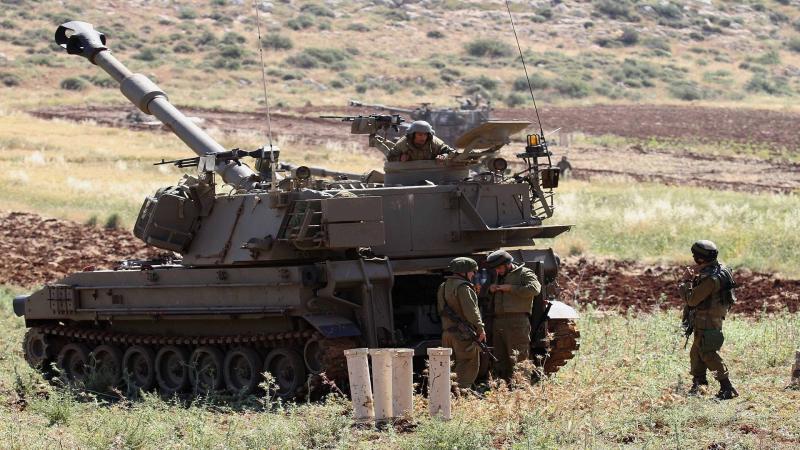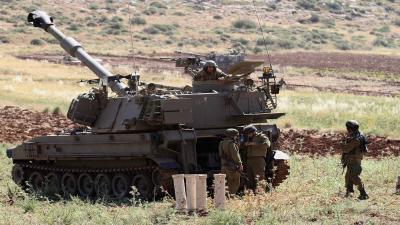Lebanon has taken action on both official and party levels, internally and externally, to contain the repercussions of the Majdal Shams incident in the Syrian Golan and to avoid an escalation of the war. The government has requested the United States to urge Israel to exercise restraint, reaffirming Lebanon's commitment to resolution "1701" and the rules of engagement that prohibit targeting civilians. This comes alongside efforts by leaders from the Druze community, notably former president of the "Progressive Socialist Party" Walid Jumblatt, to thwart Israeli attempts to exploit the incident and escalate the situation in Lebanon.
Lebanon's official stance is that it is facing "the most serious Israeli threats regarding the expansion of war on Lebanon," according to three sources; official, ministerial, and party, who spoke to "Asharq Al-Awsat." The sources noted that Lebanon is in a critical phase similar to the first week following the war's onset on October 8. One source indicated that "Lebanon received an international warning that Israel might be determined to widen the war," for two main reasons: firstly, Israeli Prime Minister Benjamin Netanyahu's intention to capitalize on the transitional situation in the United States, and secondly, Israel's aim to quell the Druze anger in the Golan, which was evident during the expulsion of Israeli officials from the funeral in Majdal Shams, and the fact that local residents did not entirely raise Israeli flags at the ceremony, despite some Druze serving in the Israeli army and a significant number of them stationed at the northern border.
Lebanese officials are concerned about "a plan to displace more towns in the border area in southern Lebanon and to create a wider buffer zone inside Lebanese depth." A Lebanese official familiar with the discussions stated, "The risks following the Israeli and Iranian positions indicate a serious engagement in the war if it expands to Lebanon, prompting local and international communications, with all parties involved appearing serious about avoiding it."
In response to this challenge, Lebanon quickly mobilized on all levels to contain the consequences and prevent Israel from escalating the conflict. This began with a statement issued by "Hezbollah" on Saturday evening, denying responsibility for launching a projectile at a civilian target. This was followed by a confirmation from Parliament Speaker Nabih Berri during a call with the UN Special Coordinator in Lebanon, Jeanine Hennis-Plasschaert, affirming that "Lebanon, despite the blatant and explicit Israeli violations of the provisions of resolution (1701), remains committed to this resolution and to the rules of engagement prohibiting the targeting of civilians." He added that "the resistance's denial of the incident in Majdal Shams in the Syrian Golan clearly affirms this commitment and limits its responsibility and that of Lebanon regarding what occurred," according to a statement from the Parliament presidency.
On the governmental side, Lebanese Foreign Minister Abdullah Bou Habib called on Sunday for "an international investigation or a meeting of the tripartite committee through UNIFIL to ascertain the truth." This was stated in remarks reported by the official National News Agency. He also demanded "full and comprehensive implementation of resolution 1701" by both parties. Bou Habib pointed out that any "significant attack by Israel on Lebanon will lead to a deterioration of the situation in the region and ignite a regional war." In a press interview, Bou Habib stated that the government requested the United States to urge Israel to show restraint. He noted that the United States asked the Lebanese government to convey a message to "Hezbollah," calling for self-restraint as well.
The American position was reiterated by Secretary of State Antony Blinken, who stated on Sunday that "all indicators suggest that 'Hezbollah' launched the missile at the Golan, leading to the deaths of 12 youths. However, Blinken confirmed that we are "determined to put an end to the conflict in Gaza. It has gone on for far too long," stressing that "we do not want to see the conflict escalate. We do not want to see an expansion. This has been one of our objectives since day one; since October 7, and we will continue to pursue that."
As part of American communications, former president of the "Progressive Socialist Party" Walid Jumblatt received a phone call from the American envoy to the Middle East, Amos Hochstein, who expressed concern about developments in the southern Lebanese front amid the Majdal Shams incident. Jumblatt reiterated "the necessity for an immediate halt to the Israeli aggression on Palestine and Lebanon," confirming his solidarity "with all Lebanese in facing this aggression." He indicated that "there is no difference between the martyrs in southern Lebanon, the Golan, and Palestine who fall due to this aggression," emphasizing that he is "continuing to work, within what is possible, to try to prevent the war from expanding."
Jumblatt's engagement holds significant implications for Druze realities in Lebanon, Syria, Palestine, and Jordan. He repeatedly urges international envoys who convey warnings of deteriorating situations to encourage the Israeli side to cease fire for the sake of achieving calm along Israel's northern borders. Drawing from his influential position, Jumblatt and other Lebanese Druze leaders, including the Druze community's Sheikh Aql, Sami Abu Al-Mun, contributed to "thwarting Israeli attempts to exploit the incident and inflaming tensions in Lebanon and fueling division between the Druze community and 'Hezbollah'," based on the party's denial of any connection to the Majdal Shams incident, according to sources following the actions of the Lebanese Druze leadership.
Simultaneously, sources close to the "Progressive Socialist Party" told "Asharq Al-Awsat" that these movements "helped absorb the majority of the anger, with the residents of the Golan contributing through their stances and not allowing the blame to fall on 'the party,' which positively reflected the situation in Lebanon." Jumblatt had confirmed in a statement that "targeting civilians is rejected and condemned," warning "everyone in Lebanon, Palestine, and the Golan against any slip or provocation in the context of the enemy's destructive project; it remains necessary to avoid the expansion of the war and the immediate halt of aggression and fire." In light of "Hezbollah's" statement, Jumblatt cautioned against "what the Israeli enemy has long worked on to ignite strife, fragment the region, and target its components; we have thwarted this project before, and as it rears its head again, we will stand ready alongside the resistance and all resistors confronting Israeli aggression and occupation."
Similarly, Sheikh Abu Al-Mun called on "decision-makers; states, leaders, and organizations" to "quickly reach a definitive halt to the war and terrorist aggressions and criminal acts." He also urged "the wise and mature people to address matters with awareness, reason, firmness of position, and unity of word."




